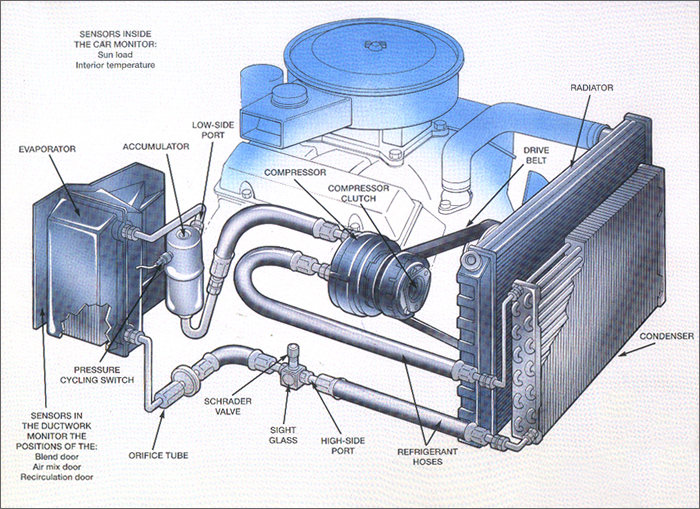Is your car's AC blowing hot air on a scorching summer day? Don't sweat it! Understanding your vehicle's air conditioning system, particularly the auto AC condenser, can save you from discomfort and costly repairs. This essential component plays a vital role in keeping you cool and comfortable behind the wheel. Let's explore everything you need to know about this crucial piece of automotive technology.
The automotive air conditioning condenser is like a mini radiator, situated at the front of your vehicle, often alongside the engine's radiator. Its primary function is to cool down and condense refrigerant, transforming it from a high-pressure, high-temperature gas into a high-pressure liquid. This process is crucial in the refrigeration cycle, enabling your AC system to effectively lower the cabin temperature. Imagine it as the heart of your car’s cooling system, pumping chilled air throughout your vehicle.
Early automotive air conditioning systems were bulky and inefficient. The modern car AC condenser we know today evolved gradually, becoming smaller, lighter, and significantly more efficient. As environmental concerns grew, so did the need for refrigerants with lower environmental impact. This led to the transition away from ozone-depleting refrigerants like R-12 to more environmentally friendly options like R-134a and now, R-1234yf. This evolution has resulted in car AC condensers that are both effective and eco-conscious.
The importance of a well-functioning auto air conditioning condenser can't be overstated. It's not just about comfort, especially in extreme weather conditions. A properly working AC system can contribute to driver safety by preventing heat exhaustion and improving focus. It also helps keep the interior of your car at a comfortable temperature, preventing damage to sensitive electronics and upholstery that can occur from excessive heat.
However, like any mechanical component, the automotive AC condenser can encounter issues. These can range from leaks and clogs to damage from road debris. Recognizing the signs of a malfunctioning condenser is important for timely repairs. Common symptoms include warm air blowing from the vents, unusual noises from the AC system, and a noticeable decrease in cooling performance. Addressing these issues promptly can prevent further damage and costly repairs down the road.
One benefit of a well-maintained air conditioning condenser is improved fuel efficiency. When the condenser is working efficiently, the AC system requires less power from the engine, leading to better gas mileage. This is particularly noticeable in stop-and-go city driving.
Another advantage is increased resale value. A car with a functioning AC system is more attractive to potential buyers, especially in warmer climates. Maintaining your car’s cooling system demonstrates that the vehicle has been well-cared for.
Lastly, a functioning condenser contributes to overall driver comfort and safety. A comfortable cabin temperature helps reduce driver fatigue, particularly on long trips, promoting a safer driving experience.
Advantages and Disadvantages of Auto AC Condensers
| Advantages | Disadvantages |
|---|---|
| Improved comfort | Can be expensive to repair or replace |
| Enhanced safety | Susceptible to damage from road debris |
| Better fuel efficiency | Requires regular maintenance |
Frequently Asked Questions
What is the function of an auto AC condenser? It cools refrigerant, changing it from a gas to a liquid.
How do I know if my AC condenser is failing? Warm air from vents, strange noises, and reduced cooling are common signs.
Can I drive with a faulty AC condenser? You can, but it's not recommended, especially in hot weather.
How often should I service my AC system? Generally, it's recommended to have it checked annually.
What causes AC condenser leaks? Corrosion, road debris, and wear and tear can cause leaks.
How much does it cost to replace an AC condenser? The cost varies but can range from a few hundred to over a thousand dollars.
Can I clean my AC condenser myself? Yes, you can carefully clean it with a garden hose, avoiding high pressure.
How long does an AC condenser last? Typically, they last several years, but lifespan can vary based on usage and maintenance.
In conclusion, your car’s auto air conditioning condenser is a crucial component for comfortable and safe driving, especially during warmer months. Understanding its function, maintenance requirements, and potential issues can help you keep your cool and avoid costly repairs. Regular checks, prompt attention to problems, and proper care can extend the life of your condenser and ensure that your car's AC system keeps you comfortable on the road. Don't underestimate the importance of this small but mighty component – it’s essential for a pleasant driving experience, especially when the heat is on. Invest in regular maintenance and address issues promptly to maximize its lifespan and enjoy a comfortable drive, no matter the temperature outside.
A journey of hope exploring justins transformation on my 600 lb life
Aesthetic language notebook covers elevate your learning
Unlocking meaningful memories fathers day gifts from kids handmade
auto air conditioning condenser - Khao Tick On
Car Air Conditioner Condenser Replacement Costs Repairs - Khao Tick On
Diagram Of Auto Air Conditioning System - Khao Tick On
Parts Of A Car Air Conditioner System - Khao Tick On
Schematic Diagram Of Automotive Ac System - Khao Tick On
Condenser Car Air Conditioner at Mary Olson blog - Khao Tick On
Car Air Conditioner Diagram - Khao Tick On
Vehicle Ac System Diagram - Khao Tick On
Choosing Between Car Air Conditioning Repair Shops - Khao Tick On
Auto Air Conditioning Diagram - Khao Tick On
Automotive Air Conditioning Repair Parts at Molly Schroeder blog - Khao Tick On
Tube And Fin Type Universal Air Conditioning Condenser - Khao Tick On
What Are The Parts Of A Car Air Conditioner - Khao Tick On












